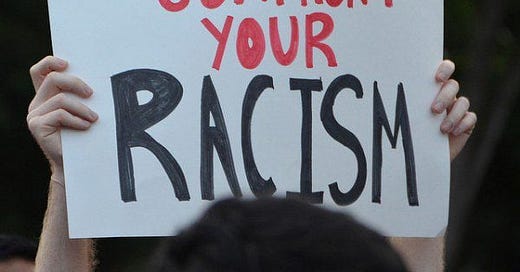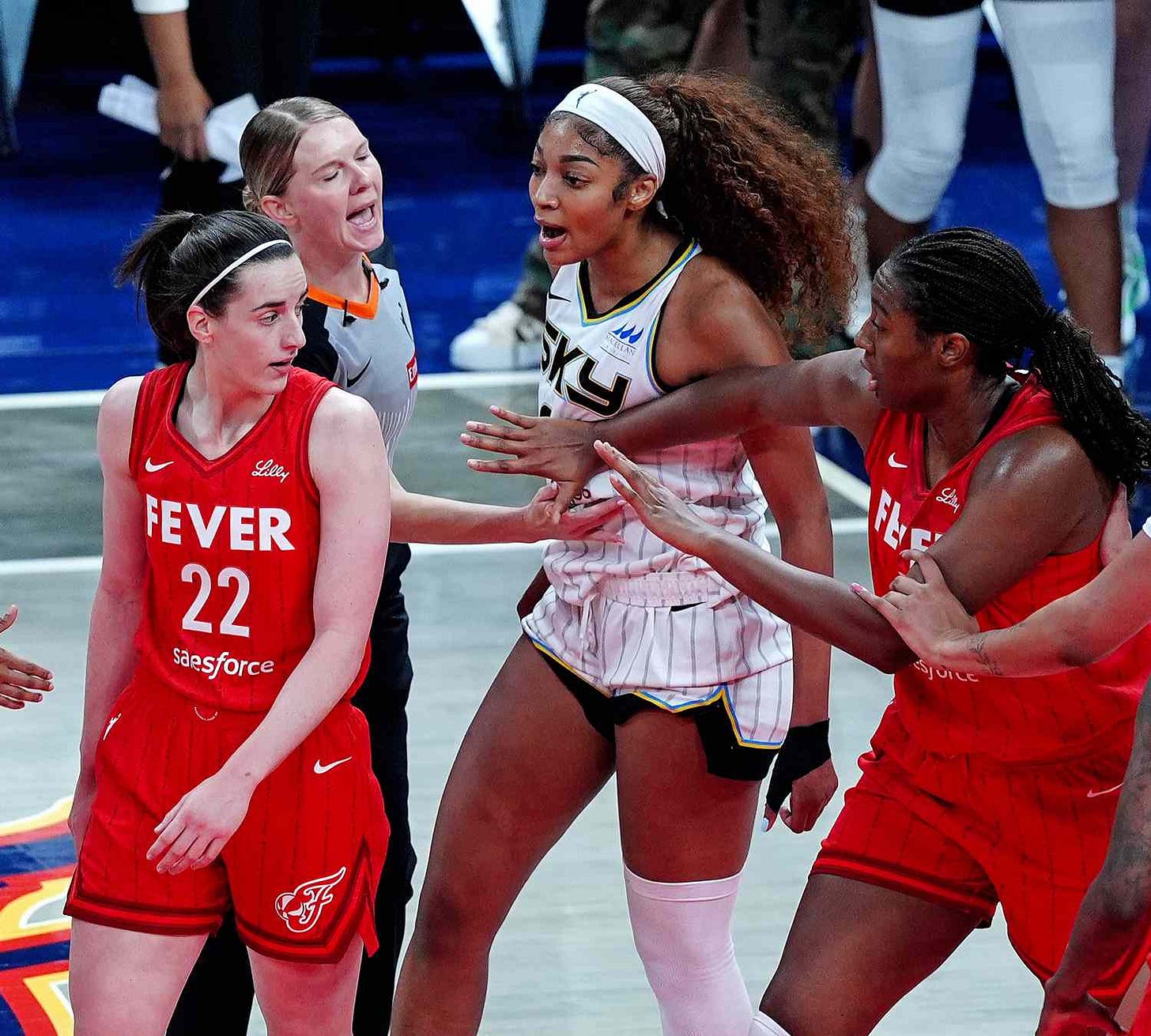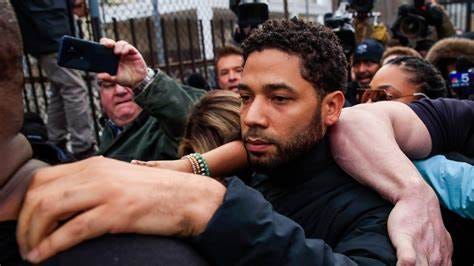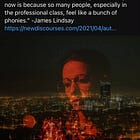An essay in which I give a rundown of the never-ending sequence of racism hoaxes and what they might reveal about our society.
Far more critical than what we know or what we don't know is what we don't want to know.
-Eric Hoffer
Confront it! Now!
The WNBA recently issued a report in response to empty claims of racist fan behavior, made by Angel Reese. After being fouled by Caitlin Clark (her vastly superior media-engineered nemesis, who just happens to be white) she missed a free-throw. She claimed after the game that fans were making monkey noises and yelling racial comments. In its report, the league stated that it couldn’t “substantiate” those claims. This is probably the fourth or fifth time this year that (female) professional athletes have made these kinds of public accusations. The WNBA seems to be a particularly fruitful source of racism hoaxes. Unfortunately for the accusers, games are recorded and televised and an audio record exists for all of them. That’s not to mention the profusion of smart phones and sympathetic fans, none of whom have ever substantiated these absurd stories (that I know of).
In several incidents, players were shown to just be lying - like when a white fan pestered players near their bus, asking for responses to questions. The man was calm and polite, and this exchange was “racist” according to the stories of the players in subsequent interviews. In most cases, claims are made without evidence. They arouse a frisson of attention (including the predictable media commentary, which assumes that these claims must be true, as if skepticism isn’t a useful tool for media personalities and journalists) and the instigators awkwardly stop talking about them after a brief period and they fade into the background. The cycle’s familiarity should itself provoke some skepticism, but these media events aren’t about the facts. They’re an opportunity for professionals to genuflect before the altar of black victimhood and such opportunities are rarely wasted.
For many people, an excuse is better than an achievement because an achievement, no matter how great, leaves you having to prove yourself again in the future; but an excuse can last for life.
-Eric Hoffer
Far more famous for his dishonest schemes and his Machiavellian gaslighting than he ever would have been for his television career, this man (who you’re already acquainted with) really WAS a decisive influence on our culture - just not in the way he desired.
Everyone (black, white, other) who does not harbor a commitment to see racism everywhere (and there are people maintaining that commitment) can see what’s going on. The act is growing more and more embarrassing as time passes.
What happens when the demand for racism outstrips the supply? What happens when people are rewarded with status and attention and sympathy for making claims of racism… and there are effectively no social safeguards in place (like skepticism, for one)? What happens when white people (especially white professionals, especially especially white professional women and managers) become too awkward and reticent to offer natural reactions or ask obvious questions in the face of these claims?
The wave of racist hoaxes isn’t the most fascinating part of this phenomenon, to me. Rather, it’s the social silence around these events, which seems to be mirrored in society in a number of areas. Everyone feels nervous about pushing back on these claims, and many people probably doubt them… but no one in power or the media or in the affected institutions says this. What can account for this kind of enforced, silent conformity?
Imagine this: you work at a high school. One of the administrators is a combative and unpleasant woman, known for stirring up drama and gossiping. The heads of school know this, the district knows this, the other teachers know this. She’s publicly reprimanded for laziness and professional negligence in a teachers’ meeting (which is a dramatic and unusual step in the world of K-12 education). The next day she claims that a noose has been found on her desk. The media gets involved. The police open an investigation. Would any of those people, when asked, go on the record and be honest about their probable doubts as to her claims? Probably not. They would lie, at least by omission. They would avoid the obvious point: she might have fabricated the whole affair, and most people who know her probably think that she did. Furthermore, if anyone stated these things publicly (things that everyone knows and believes) no one would support that person. Forget loyalty and friendship and truth and authenticity. Most people would choose to stay silent, to protect themselves. Protect themselves from what?
When we see these kinds of collective hypocrisies and mobs the fearful silence, we can be certain that there is a powerful social dynamic at work. In this case it’s the orthodoxy regarding racism (which every white person knows and almost all of them parrot and very few fully believe): racism is a serious problem that causes black people to suffer and struggle regularly. Any claims made about racism by a black person shouldn’t be treated in the normal manner. Any accusation or testimony concerning racism made by a black person is to be regarded as prima facie true and authentic. It’s a bit like allegations of sexual assault (or even impropriety) made by women. We all know that people (women, black people) lie for all kinds of reasons: affective instability, vengeance & personal hostility, protection, deflection, self-serving reasons, etc. One of the most powerfully self-serving incentives for humans is status gain. The idea that women might lie about men in order to gain status and attention is a reality that is effectively forbidden from acknowledgement and discussion. Ditto for the possibility of lying (or unhinged) black people, when it comes to racism.
When status incentives become powerful enough, and the normal social mechanisms of skepticism and reputational harm and criminal penalties are removed, certain weak and unserious people will take advantage of the loophole (which is what it is) and try to exploit the sympathies and prejudices of large numbers of people.
Here’s what all that reveals to us:
These hoaxes are common precisely because no one pushes back on them. If there’s a shortcut to gain attention or reduce culpability or defame rivals, and there’s no social consequences for taking it (even when the effects of taking the shortcut are highly antisocial) then people will take the shortcut. People must be effectively punished from exploiting the loophole and from taking the shortcut.
The frequency of these incidents (especially relative to the profound dearth of REAL, publicized instances of malignant racism) raises uncomfortable question about the progressive narrative of a “racist America.” If this country is so racist… then where’s the racism?
Racist countries experience daily hateful insults by the millions, along with acts of individual and mob violence. It’s constant. If racism was a real danger to black people in America they would certainly avoid mentioning it or stirring it up. They would be fearful of the potential consequences. Instead, certain black people gleefully seem to seek the social bonuses available. These black people are often the same ones that hold tightest to the idea of racial victimhood. What does all of this indicate about our social reality?
Even asking this question or mentioning these counterfactuals is, of course, strictly forbidden in progressive/professional circles. There’s a lot of racism; it’s a huge problem and asking about it or thinking about it in detail is not allowed. That is the leftist doublethink which has captured millions: serious problem / can’t explore.
Everyone (black, white, professional, citizen, media, consumer) understands the status incentives at play, and everyone understands the invisible barriers regarding communication and collective doubt. That understanding is partly what has allowed these realities to become weaponized.
The secrecy and the disingenuous aspect of these social restrictions is a deeper issue and it can be found everywhere. People claim to believe things that they don’t believe and they won’t admit their actual beliefs or motivations. They become angry (even vicious) when this is pointed out or they’re questioned. Entire bureaucracies operate according to these cryptic standards now, and they’re sustained by a general sense of fear - fear of controversy or embarrassment or loss of status. The cowardly always lash out at the brave when the cowardly are in power.
It has often been said that power corrupts. But it is perhaps equally important to realize that weakness, too, corrupts. Power corrupts the few, while weakness corrupts the many. Hatred, malice, rudeness, intolerance, and suspicion are the faults of weakness. The resentment of the weak does not spring from any injustice done to them but from their sense of inadequacy and impotence. We cannot win the weak by sharing our wealth with them. They feel our generosity as oppression.
-Eric Hoffer
The only way to reverse this trend is to start deploying the normal social tools in these situations. Just as criminal penalties (which currently are often nominal or nonexistent) for women who lie about men sexually assaulting them would reduce that phenomenon, skepticism and criticism and reputational penalties would reduce the frequency of racism hoaxes. This doesn’t require any special attitudes or techniques - it just requires a natural, human level of critical thinking… and a critical mass of observers/participants that are brave and honest enough to say publicly what everyone already secretly suspects.
Black people have an especial opportunity to fix this problem, since the narratives revolve around them. If, whenever insecure or manipulative or destructive black people make allegations, other black people speak up and say “bullshit (probably)” this issue will begin to dissipate.
There are the immediate social implications… and then there are the institutional dynamics. Institutions (even those composed of mostly conservatives) exist under the HR regime, and so public statements and actions are completely feminized: everything is polite, insincere, and deliberately disingenuous. It is a world of lies and distortions, which everyone knows are lies and distortions. Anyone who points the dishonesty out will be punished harshly, just like a dissenting member of a female friend group. Institutions will need to embrace accuracy and accountability, rather than lip service to outdated cultural assumptions, but institutions have their own incentives, which are rarely perfectly aligned with truth or the benefit of their members. Accountability is a terrible burden, to be avoided at all costs, in the eyes of most of today’s leaders. They conform to their organizations’ dictates (which includes parroting its values and punishing its dissenters) and in return they’re protected from uncertainty and accountability. This is the modern professional bargain. This will probably be the last piece to shift.
The media’s narrative priorities are exposed and highlighted by these incidents. The public skepticism in the wake of the Jusse Smollett incident was immediate and withering. The allegations were simply too ridiculous… but the media pretended not to hear. This bifurcated model of reality has since become comprehensive. There are the things everyone knows to be true, and then there are the things that the media maintains are true, while it pretends that the alternative (public) reality simply doesn’t exist.
Either those individuals in the Jusse aftermath (journalists, panelists, analysts) didn’t understand that this could be a hoax, in which case they probably lack the critical thinking skills that should be necessary for their trade. Or they understood that it might be a hoax and said nothing, in which case they’re dishonest. Repeat that kind of demonstrated dishonesty (for the incident was revealed to be a hoax, and a particularly shallow and absurd one) 30x, and you arrive at the point that we occupy now, in terms of public trust in the media.
Other social factors (embarrassment, workplace negligence, personal jealousy) are involved. In the opening example, Angel Reese invented a ludicrous scenario in which WNBA fans (not a lot of overlap with white supremacists there, I would think) made monkey noises and yelled racial comments. This clearly didn’t happen, so what is the explanation for her fiction? Embarrassment at a poor performance, probably (which I would think Reese might be used to by now), plus jealousy of her rival, (white and celebrated) Cailtin Clark, plus a general desire for attention. Women use social interactions to gain attention and thwart rivals differently (and more skillfully) than men. Knowing the bimodal aspects of human psychology, we would expect to see more of these hoaxes perpetrated by women (with erratic and borderline characters overrepresented), and that seems to be the case.
The mincing, absurd attitude of progressives when it comes to black Americans needs to be ridiculed so that it will end. Other categories (“queer” people, or women) are given automatic standing within modern progressivism - they’re equals, and their humanity (and agency) is fully acknowledged. Categories like Asians and Jews are tolerated but regarded with varying levels of suspicion (and certainly not inherent approval or support).
The category of ‘black people’ stands alone in this country as an infantilized and cherished captive. The bargain seems to be that no accountability will be demanded of black people and no expectations made, and in return blacks will receive set-asides and sympathy and the coddling, saccharine “support” of progressives. It’s fairly disgusting, and its absurdity becomes apparent whenever the neat racial dichotomy is breached (like when a black conservative speaks). Progressives know black people (according to them) and righteously act on their behalf. Hey… how’s that going anyway?
One of the issues of the “racism” narrative that we’re stuck in is it’s unfalsifiability. Certain decisions and outcomes and statements and encounters are presumed to be racist by one side, and there’s absolutely nothing that will convince them otherwise. “You cannot understand what it’s like to be black,” they’ll correctly note (although there are millions of different black experiences and not just one). Yet they feel secure assuming the motivations and intentions of perfect strangers… based on little more than ambiguous vibes and skin color.
It is by its promise of a sense of power that evil often attracts the weak.
-Eric Hoffer
We long ago reached the point at which hoaxes alleging flagrant racism outnumbered actual (genuine) incidents of racial concern. The trend has grown monstrous, and can be seen originating perhaps with the Tawana Brawley debacle, nearly four decades ago. Here are a few random selections from this massive data set:
Duke Lacrosse, 2006 - A black woman accused three white Duke University lacrosse players of rape with the gleeful encouragement of the media. 3 men’s lives were nearly ruined (instead they were only ruined for about 13 months)… but the media made a lot of money!
Hopewell Baptist Church, 2016 - A black church in Greenville, Mississippi was burned and spraypainted with “Vote Trump.” An investigation revealed that a black community member had committed the crimes in such a way as to suggest racism.
U. S. Air Force Academy, 2017 - A black cadet reported racist messages in his dorm, prompting a viral speech by Lt. Gen. Jay Silveria. The cadet later admitted to writing the messages himself.
Bowling Green State University, 2017 - A that a cloth-covered object indicated KKK activity. It was lab equipment, and the claim was debunked, but not before a media furor.
Capital University, 2017 - A student reported that a racist note was left on his door. He later admitted to fabricating it. It turns out that he’d done exactly the same thing in 2015.
Kansas State University, 2017 - A car was covered in racist graffiti, prompting a university rally. The perpetrator was soon revealed to have been a black man, trying to stir up controversy and attention.
Smith College, 2018 - Oumou Kanoute accused her school of racism for questioning her presence in a restricted area. An investigation found that the area was off-limits to all. Can you imagine how much media attention and social sympathy she gained from this lame attempt?
Jazmine Barnes, 2019 - A black family claimed that a white man in a truck killed 7-year-old Jazmine in a drive-by shooting. The suspect was later identified as a Black man, and the initial description was incorrect.
BYU Volleyball Incident, 2022 - Rachel Richardson, a Black Duke University volleyball player, claimed a BYU fan used racial slurs during a match. Extensive investigations, including video and witness accounts, found no evidence to support the claim.
LaTarsha Brown, an Allentown City Hall employee, reported discovering a noose on her desk, igniting widespread protests and an FBI investigation. However, DNA evidence later indicated that Brown had allegedly placed the noose herself, leading to charges of fabricating evidence and making false reports.
It should not surprise us that many of these incidents happen on college campuses. These places are unreal microcosms, where status is highly prized (whilst everyone pretends to not care about it - practice for life in professional circles). Even minimal accountability (the responsibility to turn in assignments or cite sources, for instance) is often shirked. Colleges are full of immature and privileged people, living enbubbled lives, protected by radical and extremely cowardly complexes of deans and administrators. They are a perfect place for these kinds of fabrications to occur.
The situation is a little more grounded and realistic within teachers’ unions and government buildings and in large corporations, but the HR regime still holds sway there. The toxic standard of enforced silence and mandatory dishonesty therefore functions as a status quo, ubiquitous and effectively forbidden from discussion. One imagines that if black people were in power in all of these places (or conservatives, or simply people with a basic amount of moral courage) then hoaxes would be treated much differently. It is America’s system of deliberate and artificial group concessions (enforced on an institutional basis) and its insincere dialogue around race and personal responsibility that encourages this craziness.
It seems possible that the era of racism hoaxes is slowly ending. The old sanctimonies and invisible boundaries of racial dialogue are weakening. People care dearly about status, but they can also smell bullshit. Ideally we would see a journalistic reckoning with the dynamics of these events, and the social pressures which have encourage them, but that’s probably asking for too much. Everyone craves status and positive attention, and shrinks from accountability and criticism - especially our legacy media. Whether you’re a journalist or a university student or just a regular person your best bet is probably just to be honest and admit your mistakes when they happen. DON’T make up lies about other people or circumstances. The world is now full of people to which the legacy media gave credulous and sympathetic coverage. Many of them end up discredited. These hoaxes have embarrassed the hoaxers and the journalists and administrators who have pretended that they were credible and serious. I’ll let you decide who’s suffered more reputational damage, and who should.
The education explosion is producing a vast number of people who want to live significant, important lives but lack the ability to satisfy this craving for importance by individual achievement. The country is being swamped with nobodies who want to be somebodies.
-Eric Hoffer











Pretty sure the sentence:
What happens when the supply of racism outstrips the demand?
Should have demand and supply swapped.
When victimhood becomes social currency, the legitimate complaints become difficult to sort from the exaggerated or fabricated. When I was woke and feminist, I saw these slights everywhere; I merely had to go looking for something to interpret in the worst way possible. I fear racist incidents will go the way of MeToo - we went too far in the opposite direction to unreason.